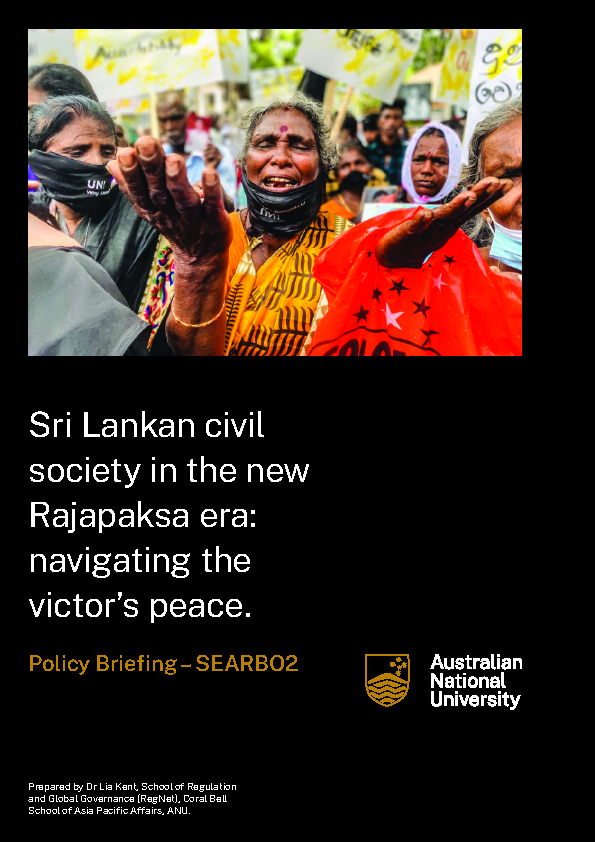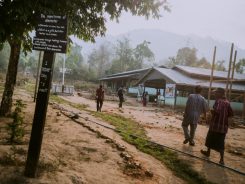In Sri Lanka, a new government has acted swiftly to curtail freedom of speech and assembly, militarise governance structures and suppress dissent. The COVID-19 pandemic is providing a convenient justification for these measures, which are having a chilling effect on civil society. This policy brief examines how Sri Lankan civil society human rights activists are navigating these challenges. It argues that the resurgence of illiberal modes of governance needs to be contextualised within the “victor’s peace” that was ushered in by the end of the civil war in 2009.
Recent presidential and parliamentary elections in Sri Lanka (2019 and 2020) saw the return to power of the powerful Rajapaksa political family. Civil society human rights activists braced themselves for a return to the militarised governance, reduced civic space and extremist Buddhist Sinhala-nationalism of the first Rajapaksa government (2005-2015).
The elections ended the so-called Yahapalanaya (good governance) coalition government (2015-2019), which had promised constitutional reform, devolution of power to the provinces and reengagement with the west, and had made international commitments to address war crimes through transitional justice mechanisms. Despite fostering high hopes amongst civil society and western donors, the government failed to follow through on many of its commitments.
The Rajapaksa government has acted quickly to militarise civilian structures, curtail freedom of speech and assembly, reduce space for civic dissent and withdraw from international commitments to transitional justice (arguing that it is protecting its “war heroes”). The national security discourse has become conveniently twinned with a discourse of protecting public health in response to the COVID-19 pandemic.
The climate of increased repression is having a chilling effect on CSOs (civil society organisations), especially those with a human rights focus. There has been a marked increase in surveillance, intimidation, monitoring and harassment of civil society organisations, especially in the Tamil and Muslim-dominated North and East. Military checkpoints have been established in these areas, and public gatherings and protests are regularly disrupted. More isolated than their Colombo counterparts due to COVID-19 travel restrictions, CSOs in the North and East also have less access to information, lawyers (should they be detained or arrested) and fewer financial resources. Some activists have adapted their strategies and activities as a form of protection, for instance by curtailing participation in public events, disengaging from social media or opting to work on issues perceived less controversial than human rights.
The post-war victor’s peace: facilitating illiberal peacebuilding
The policy brief suggests that to make sense of the challenges facing civil society now, and the reason for limited change during the Yahapalanaya era, it is necessary to reflect on the nature of the post-war peace. The civil war between the government and the Liberation Tigers of Tamil Eelam (LTTE) ended in 2009 with a crushing victory by the government over the LTTE. This has ushered in a victor’s peace in which those who were in positions of power during the war remain powerful and continue to define the peacetime narrative, and the historically-grounded power asymmetries between the state and the Tamil minority remain in place. The victor’s peace entrenched a militarised approach to governance, the centralisation of power and the cultivation of a political order “premised on Sinhala majoritarianism.” It is underpinned by a “non-pluralist” vision of the nation that is fuelled by Sinhala-Buddhist imaginings of a unitary state, and continually demarcates the boundaries of political community with reference to distinctions between “us” and “them”, “friends” and “enemies”.
The victor’s peace has facilitated the rise of illiberal peacebuilding, a trend that withstood weak reform attempts during the Yahapalanaya era and is now being reasserted with new vigour in the new Rajapaksa era.
Engaging with international human rights fora: a catch 22 for activists
The victor’s peace creates challenges for Sri Lankan civil society human rights activists pursuing “justice” for crimes committed during the war. The UN Human Rights Council (UNHRC) has been a focal point for their advocacy. Many activists engaged intensively with the March 2021 UNHRC session in Geneva, as they did with the previous 2015 session, when the Yahapalanaya government committed to a suite of transitional justice mechanisms.
Civil society advocacy engagement with the 2021 UNHRC session helped to ensure a new resolution on Sri Lanka was passed, mandating enhanced international monitoring and scrutiny of the human rights situation. Yet it also placed CSOs in a Catch-22 situation. On the one hand, the resolution will keep Sri Lanka on the agenda of the UNHRC for several more years. On the other hand, it continues to feed the Sinhala Buddhist nationalist discourse. It provides the current Sri Lankan regime with the opportunity, by positioning itself in opposition to outside (Western) powers led by the UN, to tap into patriotic, nationalist sentiments that help shore up its electoral support base. There is also a very real chance that activists will experience intensified surveillance and intimidation as a result.
Weary of Myanmar’s elite-driven peace process, some communities in Karen State are trying something different.
Notes from the Salween Peace Park
Reimaging the peacebuilding agenda: suggestions for CSOs and donors
While the return of the Rajapaksas to power and the government’s roll-back of its Geneva commitments creates myriad challenges for CSOs, this policy brief suggests it may also provide an opportunity to reflect on and reimagine the peacebuilding agenda. This includes the campaign for justice for war crimes in which CSOs and donors have heavily invested since the end of the war.
The report makes several suggestions about what this reimagining could entail. First, there is potential to broaden the scope of “justice” beyond prosecutions for wartime human rights violations in order to encompass urgent past and present injustices experienced by a range of marginalised communities. It might also involve paying more attention to the structural dimensions of injustice, including how institutions and political systems in Sri Lanka create the conditions for the abuse of power and for anti-minority sentiment. Donors and civil society activists will also need to reflect on the power imbalances and inequalities that pervade their own relationships. The question of who gets to define the peacebuilding agenda, and whose voice is heard, is critical.
There are several practical ways in which donors could support Sri Lankan civil society over the next five years. First, they could support conversations about a reimagined peacebuilding agenda. They could also help to amplify the voices of smaller civil society groups and help find avenues for these groups to speak for themselves. They could also help to promote conversations amongst different ethnic communities and across different geographic regions. Expressions of international solidarity for groups in the North and the East are also essential. Donors could help to create safe spaces for civil society groups to come together and, when COVID-restrictions permit, undertake regular visits to the North and the East, which may help to keep a check on more extreme forms of surveillance and abuse. Importantly, this support needs to be offered with a long-term time horizon in mind.
Ultimately, recent developments in Sri Lanka provide an important lesson on the need to take a long-term and less linear perspective on peacebuilding. The Yahapalanaya regime might have seen a relaxing of some of the more extreme forms of surveillance and militarisation of the previous government, but donors and civil society actors were perhaps too quick to assume that the regime change would lead to more substantive transformation. Given the victor’s peace, we are likely to see the further entrenchment of illiberal peacebuilding, at least in the short term.
The post The Rajapaksa regime: navigating the victor’s peace appeared first on New Mandala.
This post was originally published on New Mandala.

